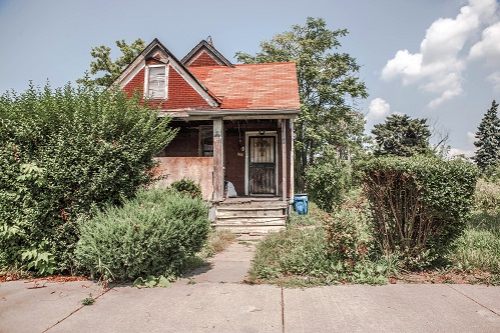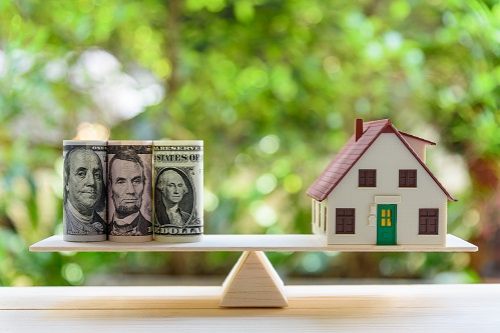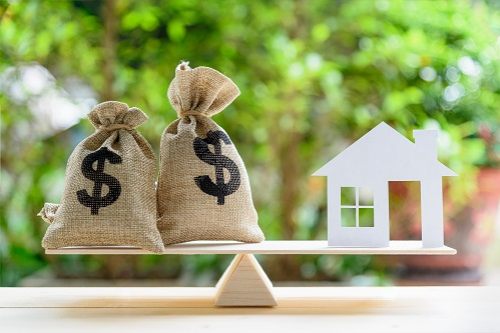- What is an underwater mortgage?
- Is there insurance for underwater mortgages?
- What causes a home to be underwater?
- What happens if your house is worth less than your mortgage?
- Does being underwater on your mortgage affect home insurance?
- What states have the most seriously underwater homes?
- How to avoid an underwater mortgage
- Frequently asked questions
What is an underwater mortgage?
A home is underwater when the homeowner owes more on the house than it is worth.
For example, if your home's current market value is $280,000, but you owe $300,000 on the mortgage, your home is underwater or upside-down. You owe $20,000 more to your mortgage lender than your home would sell for. Putting that into even greater perspective, if you sold that home, you’d pay 100% of the sale proceeds on your mortgage loan and then you’d still owe an additional $20,000 out-of-pocket.
You may also hear this situation referred to as negative equity. If you have equity in your home, that means the home is worth more in the current market than you owe on your mortgage. This is a great thing! But when you have negative equity, it means quite the opposite. It means you are underwater and that is not a good thing.
Is there insurance for underwater mortgages?
Unlike a car loan, where gap insurance is widely available to protect you from owing on your loan after a total loss, gap insurance for a mortgage is unusual. However, there are some options.
AmTrust, a financial company, offers underwater mortgage insurance. However, you can't get it once you are underwater. The company requires at least 10% equity in the home to issue a policy.
What causes a home to be underwater?
There are a number of potential causes of an underwater mortgage.
A housing market bubble burst
As a recent example, in the early 2000s, a housing bubble caused an increase in housing values and prices. When that bubble burst, many homeowners were left underwater on their mortgages. This caused the 2008 housing crisis.
Low down-payment loans
A standard conventional mortgage requires a down-payment of 20%. A lower down payment, while available with some loans, increases the risk of being upside-down on the mortgage if the house loses value.
Excessive refinancing or borrowing against the home
Borrowing against the home's equity reduces the amount of equity available and, therefore, increases the risk of becoming underwater if there are shifts in the housing market that cause a decline in values.
Missed payments
Missing your mortgage payments can cause interest to compound and accumulate, which increases what you owe. Missing mortgage payments also results in no reduction in your principal balance. The combination of no principal reduction and accrued interest charges can result in your loan amount growing instead of declining and can ultimately cause an upside-down mortgage.
Location
The location of your home can either increase or decrease your risk of an upside-down or underwater mortgage. This is usually the result of the local economy or a decline in neighborhoods that drives down property values.
According to John Romito, founder and real estate agent of Heart & Home Real Estate, "it can be difficult to even realize that a property has reached underwater status without having it appraised, but indications that problems are developing include falling property values among other homes in the area, and falling behind on payments. Falling behind can be particularly dangerous since falling too far behind on monthly payments can lead to the property being seized by the bank."
What happens if your house is worth less than your mortgage?
Just being underwater on your mortgage doesn't mean anything bad will happen. If you discover you're upside down, you have a few options:
- Do nothing. If you're able to keep making the mortgage payments and have no plans to move, you can likely just wait it out. The market is likely to recover eventually.
- Refinance. It's difficult but not impossible to refinance an underwater mortgage. Talk to a mortgage expert about your options.
- Short-sell. A short sale is when you work with your lender to sell the house for an amount that it is willing to accept to clear the loan, even if it's less than you owe. It's important to know that a short-sale will hurt your credit and may make it hard to get another mortgage for a few years.
- Work to build equity. To close the gap between what your house is worth and what you owe, consider making extra mortgage payments whenever possible and completing home improvements that will increase the value of the home.
Does being underwater on your mortgage affect home insurance?
Being upside-down on your mortgage doesn't impact your homeowners insurance, because it's not tied to the market value of your home, or to the amount of your loan.
Homeowners insurance covers the house for its replacement cost, which is the amount required to rebuild it today. This amount may be higher or lower than the market value of the home, and of the loan amount as well.
Even if the value of the home fluctuates, the amount needed to rebuild it isn't affected.
People ask
Should I reduce homeowners insurance coverage if I'm upside-down on my mortgage?
No. You need to insure your home for its replacement cost. However, you can shop around for a cheaper policy and put the extra money towards your mortgage.
What states have the most seriously underwater homes?
Some states have a lot more homes that are seriously underwater than others. As of the first quarter of 2025, Louisiana had the most seriously underwater mortgages at 10.5%. That's down over the past five years from 19.3% in 2020.
| State | Seriously underwater mortgages |
|---|---|
| Louisiana | 10.5% |
| Kentucky | 7.3% |
| Mississippi | 6.6% |
| Arkansas | 5.8% |
| Iowa | 5.7% |
How to avoid an underwater mortgage
You can't always control the things that cause a home to be underwater, but there are some things you can do, including:
- Put the biggest down payment you can on your home when you buy it
- Make bigger mortgage payments than necessary if you can, and make extra payments whenever possible
- Work to improve your home's value by keeping up on maintenance and completing upgrades
- Don't take out second mortgages or home equity loans
- Carefully review property value trends in the areas you are considering before you buy
Sources:
ATTOM. "Percent of properties seriously underwater by state for the first quarter 2025." Accessed July 2025.
Frequently asked questions
What insurance should I keep if I’m going through foreclosure?
You need to keep your homeowners insurance until you are cleared of ownership of the home.
Will my homeowners insurance cover me if I owe more than my home is worth?
Your homeowners insurance will cover the replacement cost of your home, which is not related to your mortgage balance. In a total loss, the insurance policy will pay out the dwelling coverage amount listed on the policy, not your loan balance. Remember that even if you lose the home, you still own the land, which has value as well.




